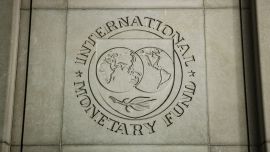United States Secretary of State Rex Tillerson closed his Latin American tour this week by hinting that Washington is ready to slap an oil embargo on crisishit Venezuela.
Tillerson – who met with President Mauricio Macri and Foreign Minister Jorge Faurie during stops in Bariloche and Buenos Aires last week – said this week that Washington’s allies on the continent are on the same page regarding Venezuela and that they all plan to reject the “illegitimate” election now planned for April 2.
Venezuela’s Constituent Assembly, a group controlled by President Nicolás Maduro’s government, this week called an election that could see the president returned to office despite opposition protests and economic turmoil. Other powers in the region, speaking under Peruvian leadership in the Lima Group, have called on the government to negotiate with the opposition for a return to constitutional democracy.
ARGENTINA LEG
Tillerson embarked upon a tour of Latin America to bolster a common front against Venezuela and to improve relations between the United States and its allies in the region. During his five-day tour, he also visited Mexico, Peru, Colombia and Jamaica.
Venezuela was high on the agenda during his time in Argentina. Macri met with Tillerson at the the Olivos presidential residence after the US secretary of state flew into Buenos Aires on Sunday from the southern city of Bariloche, where the top US diplomat rode on horseback and rested, half way through his six-day trip to South America.
At a press conference on Sunday in Buenos Aires, Tillerson said that the Donald Trump administration was not ruling out sanctions on Venezuelan oil as it seeks to turn the screw on Maduro. However, he added that the US is wary of hurting the country’s people.
The top US diplomat said he received support from other governments in the Americas, including from Faurie, but some are said to be cautious about sanctions.
Speaking alongside Faurie, Tillerson — a former CEO of oil giant ExxonMobil — confirmed the ultimate option of sanctioning Venezuela’s key oil sector was under consideration, but said that Washington shares its allies’ concerns.
Maduro himself shot back on Monday in a video on Facebook, saying that Tillerson “has just threatened us with an oil boycott. Well, we are ready. Nothing and nobody is going to stop us.”
ECONOMIC TURMOIL
Oil-rich and once one of the wealthiest countries in Latin America, Venezuela under Maduro faces economic collapse and widespread popular protest. The US, Canada and the European Union have imposed economic sanctions targeting Maduro loyalists seen as profiteers or human rights abusers.
Tillerson did not push back against the suggestion that sanctions on oil might also hurt US companies that have built refineries in the southern United States geared to accept Venezuelan crude.
“Obviously sanctioning oil or prohibiting the oil to be sold in the United States ... is something we continue to consider,” Tillerson said, while acknowledging Faurie’s concerns. But he added that Washington was also looking at how to “mitigate the impact on US business interests.”
“As the foreign minister indicated, our disagreements are with the Venezuelan regime not with the people, the Venezuelan people are suffering mightily in the current circumstances.”
Faurie agreed with Tillerson that Maduro’s attempt to brand an election on terms set by Venezuela’s non-elected Constituent Assembly as “illegitimate.” Both Faurie and Macri said the vote would be rejected by Argentina.
Asked on Wednesday whether US President Donald Trump would green-light an oil ban, Tillerson said: “Well, I don’t want to say it’s a sure thing because I want to do the work.”
The US official added that there was “great unanimity in the region and certainly in the hemisphere that we all want to see some progress on this situation in Venezuela which only gets worse day by day.”
CARIBBEAN CONCERNS
After preparing Washington’s Latin American allies for possible US oil sanctions against Venezuela, Tillerson used his stop in the Caribbean to discuss the aftermath of such a move.
Many of the island nations in the region depend to one degree or another on cheap oil imports from Venezuela, a fact that the Caracas government has used as a diplomatic bargaining-chip.
Tillerson stopped off in Jamaica on his way home from his South America leg for talks with senior Jamaican officials, including Prime Minister Andrew Holness, on how to manage any crisis. On the plane flying into Kingston, Tillerson told reporters that he had agreed with his Mexican and Canadian counterparts to set up a “very small, very focused working group” on oil sanctions.
Tillerson, a former chief executive of US energy giant ExxonMobil, said that he had also discussed with the Jamaicans how their neighbours, some of whom need more oil, would react.
And he suggested that, while no decisions have been made, the United States would be able to put together means to make up for any shortfall and increase Caribbean energy sufficiency.
“I don’t want to get into specifics because we’re going to undertake a very quick study to see if there are some things that the US could easily do with our rich energy endowment, with the infrastructure that we already have available, what could we do to perhaps soften any impacts of that", Tillerson said.


























Comments